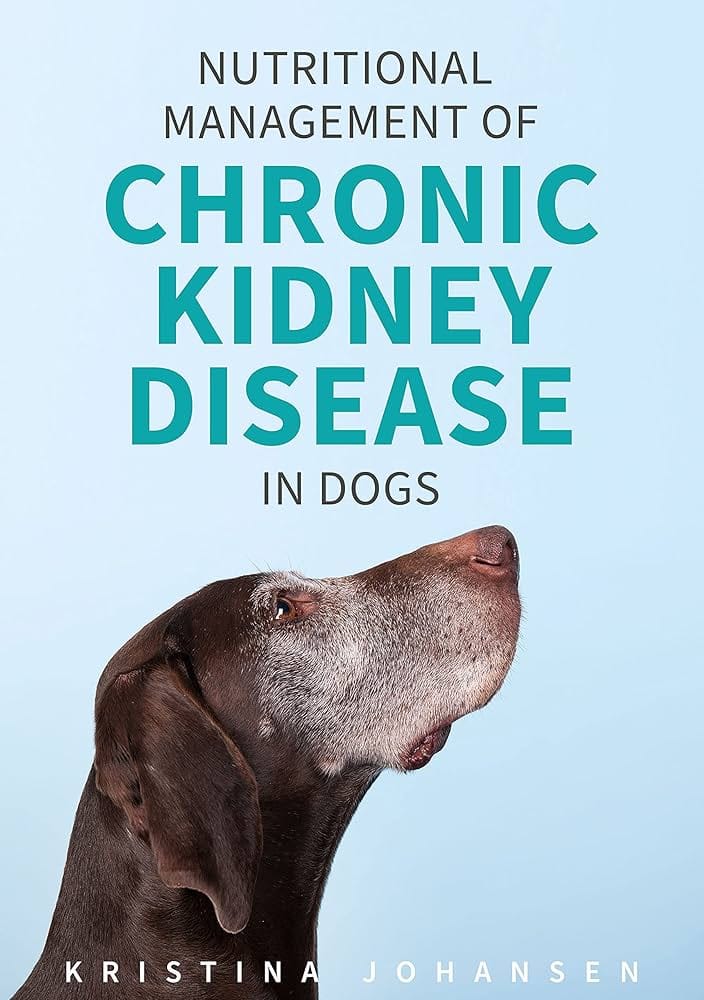Managing kidney disease in dogs crucially involves their diet. When a dog is first diagnosed, the primary concern is often simply encouraging them to eat due to potential nausea, mouth ulcers, or stomach pain caused by the disease. In severe cases, a feeding tube might be necessary to ensure adequate nutrition. Once the dog’s condition stabilizes, focusing on an optimized diet becomes paramount. Kidney diets for dogs are specifically formulated to meet unique needs, but the ideal diet can change as the disease progresses.
Key Components of a Kidney Diet for Dogs
A well-formulated kidney diet for dogs typically exhibits the following nutrient profile per 1000 kcal:
| Nutrient | Grams/1000 kcal |
|---|---|
| Protein | 31-41 |
| Phosphorus | 0.5-0.8 |
| Sodium | 0.4-1.2 |
| EPA and DHA | 0.4-1.2 |
Obtaining this precise information from pet food labels can be challenging, as manufacturers may not readily provide it. Consulting your veterinarian is essential for selecting an appropriate diet based on your dog’s specific condition.
Palatability: The Most Crucial Factor
A kidney diet must be highly palatable to entice dogs with reduced appetites due to kidney disease. The food should smell and taste appealing, as an uneaten diet provides no benefit. Kidney diets are also designed to be calorie- and nutrient-dense, allowing dogs to consume smaller portions while still receiving essential nutrients.
Hydration and Moisture Content
Adequate hydration is vital for dogs with kidney disease. Kidney diets should have a high water content, and wet food formulations are generally preferable to dry kibble. If feeding dry food, discuss with your veterinarian about adding water to it or exploring other methods to increase your dog’s water intake. It’s also important to monitor sodium levels, as excessive sodium can contribute to dehydration.
Protein: The Right Amount and Quality
Protein is a balancing act in kidney diets. While necessary for muscle maintenance and immune function, excessive protein can exacerbate the “yucky” feeling in dogs with kidney disease due to its breakdown products. The goal is to provide just enough highly digestible protein to meet essential needs, with any additional calories ideally coming from carbohydrates and fats. Protein sources should be highly digestible and provide all essential amino acids.
Low Phosphorus Levels
A direct correlation exists between protein intake and blood phosphorus levels. As kidney function declines, dogs struggle to excrete phosphorus, leading to its buildup in the bloodstream. Reducing dietary phosphorus intake is a proven method to slow kidney disease progression and potentially extend lifespan. This is often achieved by carefully managing protein levels and including protein sources relatively low in phosphorus, such as plant-based options, which tend to be lower than animal-based proteins.
Essential Supplements
Certain nutritional supplements can further benefit dogs with kidney disease:
- Omega-3 Fatty Acids (EPA & DHA): These can help reduce inflammation within the kidneys and may improve kidney function.
- Antioxidants: These neutralize damaging free radicals that can harm the kidneys.
- Fermentable Fiber: This aids in eliminating protein digestion waste products, potentially allowing for increased protein intake.
Prescription vs. Homemade Kidney Diets
While homemade kidney diets can be considered, especially if a dog refuses prescription options, their formulation is complex. A 2012 study found that a significant majority of homemade kidney diet recipes available in books and online failed to meet essential nutritional requirements for adult dogs. Reputable prescription kidney diets, conversely, undergo rigorous testing to ensure safety and efficacy for long-term feeding.
If you opt for a homemade diet, it is crucial to work with a veterinary nutritionist or a service like BalanceIT (requiring veterinary approval) to ensure the recipes are nutritionally complete and balanced.
Popular Prescription Kidney Diets
Veterinarians commonly recommend prescription kidney diets after a dog is diagnosed and stabilized. Some widely used options include:
- Hill’s Prescription Diet k/d Kidney Care: Available in both wet and dry formulations with various flavors.
- Purina Pro Plan Veterinary Diets NF Kidney Function: Offered in wet and dry forms.
- Royal Canin Veterinary Diet Adult Renal Support: Comes in wet and dry options, with variations for early and advanced kidney disease and different flavors.
Transitioning Your Dog to a Kidney Diet
The transition to a new diet should be gradual and carefully managed, especially if your dog is experiencing nausea. Introduce the new food slowly to prevent food aversion and allow their digestive system to adapt. A typical two-week transition schedule might look like this:
- Days 1-2: 5% new food, 95% old food
- Days 3-4: 10% new food, 90% old food
- Days 5-6: 20% new food, 80% old food
- Days 7-8: 40% new food, 60% old food
- Days 9-10: 60% new food, 40% old food
- Days 11-12: 80% new food, 20% old food
- Days 13-14: 90% new food, 10% old food
- Day 15: 100% new food
If your dog shows reluctance to eat or experiences digestive upset, revert to the previous step and proceed more slowly.
Monitoring After Diet Transition
If your dog is having difficulty adapting to a kidney diet, contact your veterinarian. They can offer solutions such as:
- Suggesting palatable food toppers (avoiding those high in phosphorus or salt).
- Prescribing medications to manage nausea, inflammation, or other appetite-reducing symptoms.
- Recommending alternative prescription or over-the-counter diets.
- Referring you to a veterinary nutritionist for homemade diet plans.
- Discussing the potential benefits of a feeding tube.
With the right nutritional support, many dogs with kidney disease can live comfortably for extended periods. Studies suggest that dogs on a kidney diet may live significantly longer than those fed regular dog food, highlighting the profound impact of proper nutrition.

